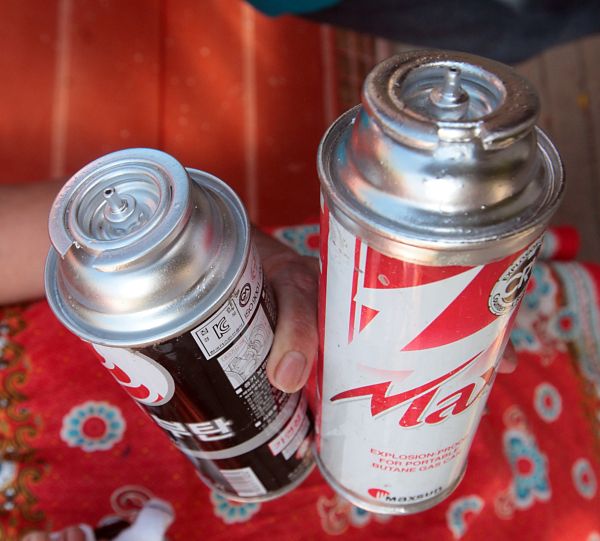
According to DOE, it is not safe to refill used butane canisters with LPG.
LPG refillers lobby to have cans tested as ‘safe’
It’s cheap, handy and everywhere.
While the refilling of LPG in butane canisters is banned as a fire hazard, the widespread use and sale of these portable cooking gas cans makes a crackdown difficult.
Industry players are pressing the government to reconsider the ban.
“A mandatory cease-and-desist order of all refillers’ operations will just lead to the proliferation of backyard refilling due to market demand. Thus it will more hazardous,” said leaders of the Cebu LPG Budget Gas industry Player Association.
They described the growth in the “market-driven product” as “phenomenal”, with over 150,000 canisters a day in circulation.
The group also confirmed that it was the manufacturer of LPG-refilled butane cans with the “Type O” brand identified with former mayor Tomas Osmeña.
DON’T STAMP OUT
In a press conference yesterday, industry stakeholders renewed their call for the Department of Trade and Industries (DTI) and other agencies to set standards and regulate — instead of stamp out – butane refilling businesses.
Low-income households are the main consumers of the product, which retails for as low as P18 each for a 250-gram can compared with P600 for an 11-kilogram tank of LPG.
Last Nov. 6, an inter-agency task force with the Department of Energy- 7 and Cebu city government said it plans to do a “massive confiscation” of illegal refiled butane canisters after a one-week information drive.
They were moved to act by the Nov. 3 explosion of stocks of butane canisters in a home-based refilling station in barangay Kinasang-an-Pardo, Cebu City, where eight workers were injured. The enterprise had no business permit or government license.
The DOE has repeatedly warned that butane gas canisters were not designed to store LPG, but are intended for one-time use.
The thin metal bodies are less durable than the welded steel LPG tanks, and loading them with LPG could lead to gas leaks, explosion and fire.
PRESSURE TEST
Basillo Alo, association secretary, yesterday said they are urging the DTI to conduct standard testing to show that the tin canisters are “safe” to use for LPG refills.
These involve standard “burst tests”and pressure tests, he said.
Their goal is to have the DTI recognize the products and thus provide basis to counter a 2014 Department of Energy (DOE) circular on rules and regulations of the LPG industry, where Section 25 declares “illegal”” the refilling of LPG into “single trip and/or tin canisters or cartridges not designed o intended for LPG.”
“We also want to discontinue backyard refillers because they greatly affect our sales” said Alo.
He said the association’s nine member companies have business permits and Standard Compliance Certificate (SCC) as legitimate LPG Tank refillers from the DOE.
“As far as we can tell, we all started as LPG tank refillers. We started refilling canisters when the butane stove was first popularized in 2008,” said Alo.
He said they use LPG from bigger refillers operating in Mandaue, Talisay and Danao cities.
When butane canisters became popular, companies ventured into LPG refilling to meet the high market demand.
Engr. Ed Antilligando, a member of the board of directors, said 1.2 million people would be affected in Cebu if the LPG-refilled butane business is closed.
The association estimated that in 2015, LPG-refilled canisters exceeded 1,000 metric tons a month in Metro Cebu, serving the C-D-E market segments in urban areas.
“The rate of increase of this market-driven product is way beyond our comprehension. It’s phenomenal,” said the association in its presentation.
It said each household uses at least 200 to 250 grams of LPG a day, about the size of one canister.
In a separate interview, DOE 7’s Legal officer Mark Russ Gamallo said all parties have to comply with the circular issued by then Energy Secretary Jericho Petilla spelling out the regulations for LPG industry players.
Operators need an Standard Compliance Certificate to operate legally.
Under Section 25, refilling a canister with LPG is illegal per se.
If stakeholders disagree, they will have to settle this in court, said Gamallo.
“Based on our records we have not issued any SCC yet to an LPG-refiller who uses butane canisters” said Gamallo.
Former mayor Osmeña told reporters that LPG-refilled canisters are safe to use because the dealers sold them brand new.
At P17 each, they are affordable to any budget-tight family.
“We even put small dots on the side of the canister so that when refilling station refill them they will mark the dots” he said.
The BOP-K canisters have 45 dots which Osmeña explained means it can be used 45 times without showing signs of defects.
Osmena said the group that manufactured the butane canisters have permits
“As far as i know, there is no ban,” he said.
Disclaimer: The comments uploaded on this site do not necessarily represent or reflect the views of management and owner of Cebudailynews. We reserve the right to exclude comments that we deem to be inconsistent with our editorial standards.
